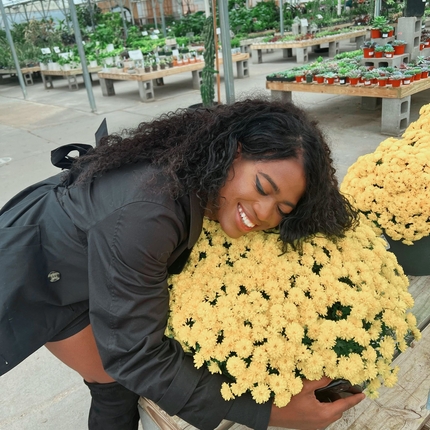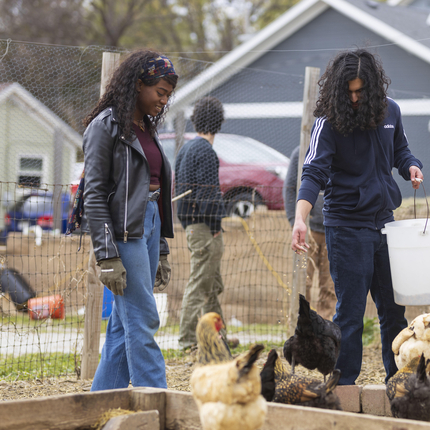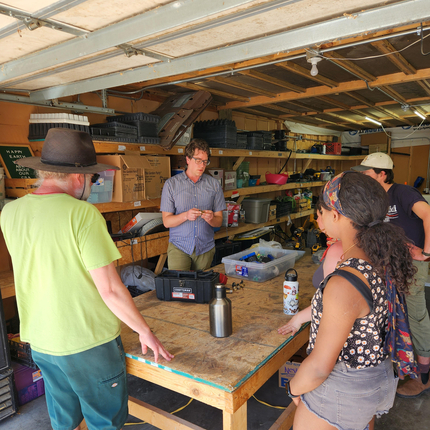Cait Caughey contributed to this story.
Several years ago, Amarah Wright started down the path toward opening her own apothecary and nursery. She had no idea that, along the way, she’d also begin a journey in farming and conservation.
To get closer to her goal of opening her own business, Amarah started studying herbalism and developed an interest in farming. As she spent more time with the land, she felt the need to form a deeper connection to the earth.
To fill this gap, she joined the Big Muddy Urban Farm residency program, in her hometown of Omaha.
“I want to truly understand the essence of plants and their role as living beings on this planet,” said Amarah. “This felt like the next logical step in that direction.”
Big Muddy Urban Farm functions as an educational nonprofit to provide a season-long learning experience for live-in farm residents, like Amarah. The farm offers the Center for Rural Affairs’ Beginning Farmer Conservation Fellowship Program as an additional option for first-year residents to help round out their farm experience and focus on how to implement conservation practices in an urban farming setting.
The Beginning Farmer Conservation Fellowship began in 2022 with eight individuals, plus mentors. The second cohort began in February 2023 with eight beginning farmers, including Amarah.
“This was an opportunity presented to me through my association with Big Muddy, and it has been everything I’ve needed plus more,” she said. “I have this belief that if you’re going to learn something it is best to do it by the book. I came into this program with the intention of it being career-defining so I needed to learn what I could in the most effective manner possible.”
Amarah is part of the team that takes care of the land at Big Muddy Urban Farm. They farm and maintain five plots of land in the Gifford Park neighborhood in Omaha, and most of their produce is used to supply their 40-person Community Supported Agriculture (CSA) program that lasts about 18 weeks.
“To know that I am learning to farm in a way that aims to conserve and nurture this planet that gives us everything makes me feel like I’m doing my part in the greater scheme of things,” said Amarah. “I’d prefer for my impact to be positive, and that makes farming using conservation practices the only option to me. Luckily for me, that was my intention; it is all that I know at this point and that’s extremely comforting to me.”
Conservation fellows also design and implement a conservation project on their own farms or land they are farming. They present their findings at a farm tour to their mentors, project partners, and other beginning farmers.
Amarah’s project is titled "Humanity's role in ecology” and aims to ask the question: "What are we doing for our planet in a mindful way?"
“My goal is to empower and help others recognize the power that could live in our backyards,” she said. “Essentially, my project is a collection of prairie and medicinal patches. The aim is to create habitats and to mindfully create spaces that are in harmony with nature. When our environment reflects harmony, our lives tend to move in that direction as well, and this is the basis for a preventative/holistic health model.”
At this point in her journey, Amarah says everything she does is informed by nature, and she plans to continue with that mindset.
“I tend to live my life in a symbolic and idealistic way, and I find it fascinating to understand the essence and distinct differences of the various cycles that occur in nature,” she said. “Being deeply involved and invested in the land has taught me so much about these patterns and cycles. I have developed a deeper understanding surrounding certain principles that I live my life by.”
She also feels that as a farmer, it’s her responsibility to take the time to understand the land–everything from the soil to the weather, as well as the wildlife and plant life.
“There have been a couple of times this year where we missed our window to do certain things, but being adaptable and understanding when to double down and when to pivot are valuable lessons that I have learned through my experiences with nature,” Amarah said. “When we know better, we do better. The better we all do, the higher the standard. Our earth deserves the best because we do as well.”
The Beginning Farmer Conservation Fellowship is a program of the USDA-NRCS under agreement number NR223A750003C004 Conservation Outreach: Equity Conservation Cooperative Agreements.







